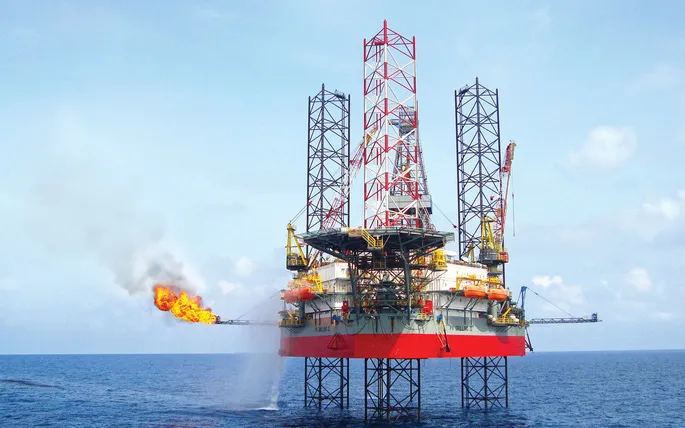
However, even though PVD was a leading company which was listed quite early, it was unable to retain its position as a blue chip stock after oil prices and stock shares fell below par value.
Impressive start
In November 2001, PetroVietnam Drilling and Well Services Corporation (PVD), a subsidiary of Vietnam Oil and Gas Group (PVN) was established under Decision 647/QDVPCP. In 2005, following the direction of PVN on promoting innovation and development of enterprises under the overall plan of arrangement and renewal of affiliated State enterprises, PVD switched to becoming a joint stock company.
In 2006, PVD inaugurated the first fully jacked-up offshore drilling rig owned by Vietnamese. In 2008, PVD merged with Vietnam Petroleum Investment JSC (PVD Invest), bringing the total assets to VND 12,000 bn and the charter capital to VND 2,105 bn. In addition, PVD established PVD-Expro and PVD Tubulars Management Joint Ventures, implementing joint venture strategies with foreign partners to enhance competitiveness and develop more services.
PVD is a well-established regional contractor with four new-generation jack-up rigs, one semi-submersible drilling rig (TAD) and one land rig. In December 2006, after operating for only one year as a JSC, PVD officially listed shares on HOSE at a closing price of VND 130,000 per share. The peak of PVD was established in the trading session on 3 February 2007 at VND 295,000 per share.
Notably, from the listing date to the 2014 period, PVD continued to grow in both revenue and profits. The peak came in 2014 when both net revenue and profit after tax showed impressive figures, the highest in history with VND 20,884 bn revenue and VND 2,539 bn in profits. Business results in 2004 also contributed to pushing PVD to the peak at around VND 80,000 per share (adjusted due to issuance of additional shares).
Fall in oil prices
Since 2015, the fall in oil prices led to a gradual decline in business results. In fact, 2015 was a difficult year for the oil and gas market with oil prices falling by more than 60% to below USD 40 per barrel. The oil and gas drilling service market was also strongly affected when contractors stopped extending drilling programs. Drilling rents and technical services decreased, as well as fierce competition due to a number of inactive rigs increased. In Southeast Asia, the utilization rate of drilling rigs decreased from 94% in 2014 to about 69%. In Vietnam, the average number of active rigs decreased from seventeen to only seven.
For PVD, three fifth of drilling rigs suffered from inactivity in 2015. Besides, the sharp drop in oil prices also led to a 15-25% reduction in drilling rigs and drilling related services. In this situation, PVD revenue and profits in 2015 decreased by 30.8% and 31.2% respectively. The decline in business performance pushed PVD to fall for the first time and shares fell to VND 15,000 per share, soon after information spread that former Chairman Do Van Khanh was prosecuted for cases related to the Ocean Commercial Joint Stock Bank (Ocean Bank).
In recent years, when PVD's production and business activities have shown signs of prosperity, the oil price incident has been a reminder that continues to obsess shareholders. In 2019, profit after tax reached VND 177 bn, up by 2.5%, and the world oil and gas market saw many positive changes. Brent oil price at the beginning of the year reached over the threshold of USD 65 per barrel. However, the oil price event once again pushed PVD down in fear. After the information of oil price dropped more than 30%, down to just over USD 30 per barrel, PVD continuously dropped and for the first time in its 14-year trading history, this stock fell below par value to VND 10,000 per share.
Uncertain future
In fact, without the recent oil price shock, PVD's business in 2020 will also be questioned for its strategy to place all eggs in one basket. According to Vietcombank Securities (VCBS), 2020 could be a good year for PVD in its business activities thanks to contracts signed in the first six months of 2019, along with the increasing demand for drilling rigs in the Malaysian market. PVD's current business depends heavily on the Malaysian market, while the number of domestic jobs is quite low.
However, the stability of Malaysian oil market is also a matter of concern. The Malaysian government has imposed barriers against foreign investment in the domestic oil and gas market since the 2015 oil price crisis. Due to the general difficulties of the oil and gas industry at that time, the Malaysian government has made policies to protect domestic oil corporations which is completely understandable.
Currently, most of Malaysia's major oil and gas projects that were lying suspended since 2015 were restarted in 2019, after oil prices rose in 2017 and 2018. Whether or not the projects are implemented depends on the average annual oil price compared with the breakeven price at each oilfield. Therefore, when the average oil price in 2018 surpassed USD 65 per barrel, it was an appropriate condition for the projects to be implemented simultaneously, leading to a sharp increase in drilling demand and drilling services.
However, in the case of a sharp drop in oil prices, PVD's mining projects in Malaysia will be on pause again. Low oil prices are expected to slow down PVD exploration activities, leading to a slow recovery.




















